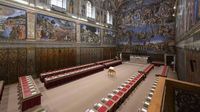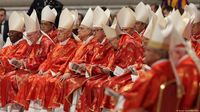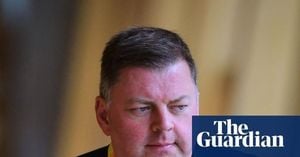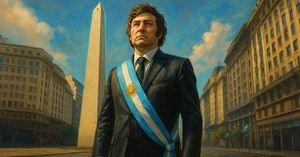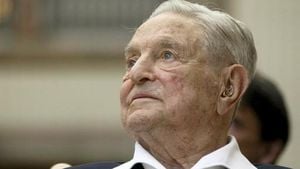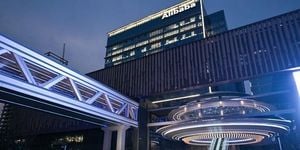On May 7, 2025, the Vatican commenced a significant chapter in its history as the conclave to elect the 267th Pope began amidst a backdrop of solemnity and hope. The day started with a Mass at St. Peter's Basilica, led by Cardinal Dean Giovanni Battista Re, where he reminded the gathered cardinals of their "highest" responsibility in selecting a successor to the late Pope Francis. This event attracted thousands of faithful, who filled the basilica and the surrounding square, eager to witness the beginning of this pivotal moment for the Catholic Church.
The Mass was not merely a ceremonial prelude; it served as a spiritual preparation for the cardinals, who will enter the Sistine Chapel later in the day to begin the voting process. Cardinal Re emphasized the need for a leader who can guide the Church through the complex challenges of the modern world, stating, "We are here to ask for the Holy Spirit's assistance, to seek His light and strength so that the Pope elected will be the one that the Church and humanity need at this difficult and complex turning point in history."
As the clock struck 10:00 AM, the Mass commenced, marking the formal start of the conclave proceedings. The 133 cardinals, dressed in their red and gold vestments, participated in a long procession, symbolizing unity and purpose as they prepared to elect the next Pope. The atmosphere was charged with anticipation, with many cardinals expressing their hopes for a leader who continues the legacy of Pope Francis.
Angela Merkel, the former Chancellor of Germany, articulated a common sentiment among many observers. She expressed her desire for a new Pope who embodies the same closeness to the people that characterized Francis's papacy. Merkel noted, "It would be nice if there were continuity, if the next encyclical could again deal with community goods or if simply the thread that he set, a human-centered Pope, could be continued." This reflects a broader expectation that the next Pope will maintain a focus on pastoral care and social justice.
Meanwhile, Ecumenical Bishop Christian Kopp echoed this sentiment, emphasizing the need for the new Pope to uphold the values of inclusivity and dialogue. He stated, "The Church's place is with the weak. We need a Pope who understands how important it is to foster unity and cooperation, even amid diversity." Kopp's remarks highlight the ongoing conversation within the Church regarding its role in addressing contemporary social issues.
As discussions surrounding the papal election unfolded, the Venezuelan Cardinal Baltazar Porras noted a significant shift in the center of Christianity. He remarked, "Europe is no longer the center of Christianity," indicating that the future of the Church may increasingly rest in the hands of leaders from Africa and Latin America, where the majority of the Catholic population now resides. This perspective underscores the importance of understanding the diverse cultural contexts in which the Church operates.
Adding to the dialogue, Beate Gilles, the General Secretary of the German Bishops' Conference, expressed her hopes for a "beneficial decentralization" of the Catholic Church under the new Pope. She emphasized the need for the Church to respond to cultural changes and societal needs, advocating for discussions around women's ordination and the acceptance of diverse lifestyles. Gilles stated, "The papacy can unleash a great force in the world, especially in times of unrest."
The day also saw reflections from former Federal Minister Anja Karliczek, who emphasized the need for reform within the Church to address the differing expectations of Catholics across the globe. She remarked that if the Catholic Church in Europe does not want to become a niche community, it must be responsive to the needs and rights of its members, particularly women.
As the hours passed, Cardinal Gerhard Ludwig Müller prepared for a conclave that could extend over several days. He shared his thoughts with the press, stating, "I have packed my suitcase for five or six days. The election can be quick, but it can also take time. One must be prepared." This sentiment reflects the uncertainty and gravity of the process ahead.
By the afternoon, the atmosphere was electric as the 133 cardinals prepared to enter the Sistine Chapel for the first round of voting. The chapel, adorned with Michelangelo's masterpieces, would serve as the backdrop for this historic decision, shielded from the outside world. The first smoke signal from the chimney is expected around 7 PM, indicating the outcome of the initial vote—white smoke for a new Pope, black smoke if the voting continues.
As the conclave unfolds, the Catholic Church stands at a crossroads, with diverse perspectives and hopes for the future. Some cardinals advocate for continuing the reforms initiated by Francis, while others call for a return to traditional values. This internal dialogue is crucial as the Church seeks a leader who can unify its global congregation while addressing the pressing issues of the day.
Brother Paulus Terwitte, a Capuchin friar, shared his thoughts on the papal election, emphasizing the need for authenticity over celebrity. He stated, "I don't need a superstar in the Vatican. I need a brother in faith who reminds me of what truly matters." His perspective reflects a desire for a Pope who embodies the essence of the Gospel and prioritizes spiritual over superficial leadership.
As the sun sets on this historic day, the world watches with bated breath, awaiting the decision of the cardinals who will shape the future of the Catholic Church. The next Pope will not only inherit the legacy of Francis but also face the immense task of guiding a diverse and evolving global Church through the complexities of modern society, ensuring that it remains a beacon of hope and unity for its 1.4 billion followers.
